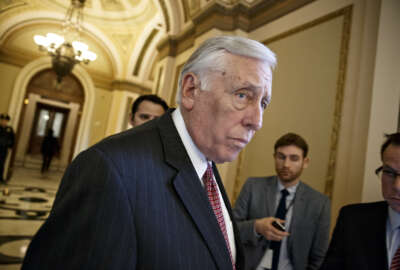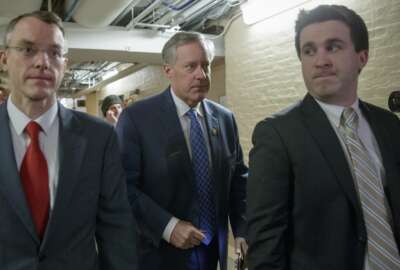
100 House Democrats voice opposition to Trump’s proposed federal retirement cuts
About 100 House Democrats wrote to Speaker Paul Ryan (R-Wis.) and Minority Leader Nancy Pelosi (D-Calif.), voicing their opposition over the president's four ma...
About 100 Democrats wrote to their leaders in the House to voice their opposition of the president’s proposals that would make significant changes to the federal retirement system for current and future employees and retirees.
Specifically, they urged House leadership to prevent legislation that includes the proposals from being brought to the House floor. They’ll oppose any language that includes these changes, the lawmakers wrote.
Top Congress Stories:
Reps. Gerry Connolly (D-Va.), Jamie Raskin and Elijah Cummings (D-Md.), along with House Minority Whip Steny Hoyer (D-Md.) and nearly 100 other House Democrats voiced their opposition in a letter to Speaker Paul Ryan (R-Wis.) and Minority Leader Nancy Pelosi (D-Calif.).
“These are highly skilled and dedicated public servants,” members of Congress wrote. “Taking their pensions away and gutting their pay would have the effect of pushing those skilled people out of the civil service and impairing the recruitment of new talent.”
The president’s fiscal 2018 budget included four major changes to federal retirement:
- An increase in employee contributions by 1 percent each year for the next six years,
- An elimination of the cost-of-living adjustment (COLA) for current and future Federal Employee Retirement System (FERS) participants and cutting the COLA by 0.5 percent for Civil Service Retirement System (CSRS) participants of what the typical formula currently allows,
- basing future retirement benefits on the average of an employee’s highest five years of salary. Currently, retirement benefits are based on an employee’s length of service, salary and highest three-year average salary, and,
- Eliminate supplemental payments to employees who retire before age 62.
The administration sees these changes as a way to realize new cost savings — more than $4.1 billion in 2018 and at least $149 billion over the next 10 years — and bring the generous federal retirement package in line with the private sector.
But these proposals are particularly offensive, lawmakers said, because they would impact current and future retirees, not just prospective federal employees.
“This breaks a promise to current federal employees and retirees,” they wrote. “We should not alter policies that families have planned their lives around, particularly when it affects current retirees with limited ability to make up for unforeseen reductions in expected income.”
Several federal employee unions and organizations have adamantly voiced their own concerns over the president’s retirement proposals.
“In exchange for years of hard work over long careers, our government made a commitment to middle-class federal and postal workers in the form of modest federal pensions in retirement,” the coalition said. “Those pensions are not gifts; they were earned. Diminishing their value in any way for current employees and retirees fails to honor the commitments made to our public servants.”
The Federal-Postal Coalition sent its own letter earlier this week to every member of Congress. The coalition consists of 30 organizations, including the National Treasury Employees Union, Senior Executives Association, National Active and Retired Federal Employees Association, National Association of Letter Carriers and the American Federation of Government Employees.
AFGE released a video to its members, specifically describing what the president’s budget proposes and it how the changes, if enacted, could impact their current and future retirement plans.
Copyright © 2024 Federal News Network. All rights reserved. This website is not intended for users located within the European Economic Area.
Nicole Ogrysko is a reporter for Federal News Network focusing on the federal workforce and federal pay and benefits.
Follow @nogryskoWFED
Related Stories

Trump’s proposed retirement changes would have major impacts on current feds and retirees




